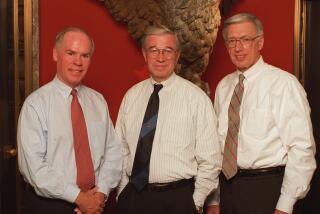Henry ‘Harry’ Rowen, Rand leader at time of Pentagon Papers, dies at 90
Economist and security expert Henry “Harry” Rowen was president of the Rand think tank when it produced the Pentagon Papers, an incendiary study of U.S. involvement in the Vietnam War.
“I’m one of the people who said we should really get a record of this thing which has turned out so badly,” he told the author of a 2010 history, “Rand in Southeast Asia.”
The comprehensive study was top secret. But in 1971, Rowen’s close friend and protege Daniel Ellsberg leaked it to the New York Times. After publication of portions of the study triggered an international outcry against U.S. policies, Rowen resigned from Rand.
To this day, Ellsberg regrets how his actions affected Rowen.
“He was the closest friend I ever had,” Ellsberg said in an interview this week. “I loved him like a brother.”
“All I could do was keep him from having any hint of what I was up to, so he could say honestly he had no idea of it at all.”
Rowen, 90, who had a six-decade career as a policymaker and educator, died Nov. 12 near Stanford University, where he was a longtime instructor. He collapsed in a parking lot while on his way to an event, said his son Chris Rowen. The cause is believed to have been a heart attack.
A key player in forming military strategies during the Cold War, Rowen began working at Santa Monica-based Rand Corp. in the early 1950s. From its founding in 1948, the institution has been heavily involved in advising the U.S. military.
“Rand was a very exciting place,” Rowen said at a 2008 symposium at UC Berkeley. “It had quite a lot of talent there in many of the relevant disciplines.”
Rand helped the government fill gaps in nuclear policies that were “really kind of remarkable in hindsight,” he said. He cited a plan by the Strategic Air Command for bombers approaching the Soviet Union to continue toward their targets unless called back by radio messages.
“We said this was a really bad idea. Radio is not that reliable,” Rowen said. The policy was reversed so that bombers would return to their bases “unless they get a signal to go ahead.”
In 1960, Rowen became a research associate at the Harvard Center for International Affairs. The next year he was appointed deputy assistant secretary of Defense for international security affairs. He also served as assistant director of the U.S. Bureau of the Budget.
In 1967, he returned to Rand as its president. During his tenure he established a graduate school associated with the think tank and expanded the institution’s ventures into advising on non-military, domestic policies.
Ellsberg was a systems analyst at Rand. “Harry was a brilliant guy,” Ellsberg said. “A lot of people found him brusque or cool, but not with me.”
Ellsberg said he disclosed the Pentagon Papers in an attempt to shorten U.S. involvement in the war. He was tried on charges of theft and espionage, but all charges against him and fellow Rand researcher Anthony Russo were dismissed.
“The greatest cost in my life with the Pentagon Papers,” Ellsberg said, “was the loss of that friendship [with Rowen] and the thought that I was going to harm my friend in his professional life.”
Rowen resigned from Rand in 1972. “Maintaining vitality in institutions and in people is brought about by change,” he said in 2005. “Rand and I are no exception.”
Henry Stanislaus Rowen was born in Boston on Oct. 25, 1925. He earned a bachelor’s degree in engineering from MIT and later studied economics at Oxford.
Rowen became a professor in Stanford’s business graduate school in 1972.
In the following decades, he also chaired a Department of Energy task force on the future of science programs and served on commissions studying intelligence about weapons of mass destruction. He returned to the Defense department as assistant secretary for international security affairs from 1989 to 1991.
Rowen remained active at Stanford in recent years, riding his bicycle to the campus to sit in on lectures. He also maintained a blog on the university’s Asia-Pacific Research Center site.
“He was very proud that he was probably the only person in his retirement community who had his own blog,” Chris Rowen said.
In addition to Chris, Rowen is survived by his wife, Beverly; daughters Hilary, Sheila and Diana; sons Michael and Nicholas; and nine grandchildren.
More to Read
Start your day right
Sign up for Essential California for the L.A. Times biggest news, features and recommendations in your inbox six days a week.
You may occasionally receive promotional content from the Los Angeles Times.







